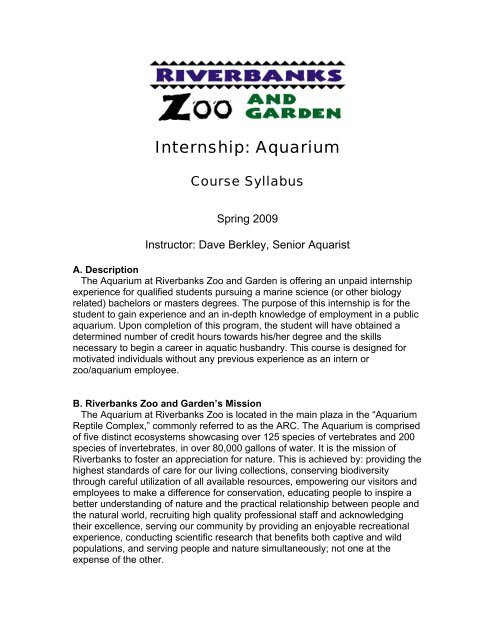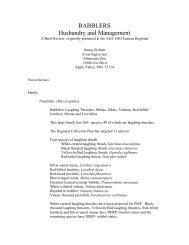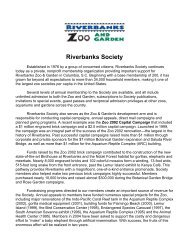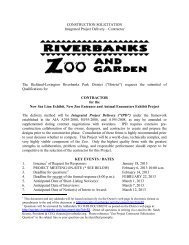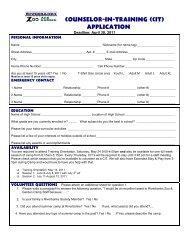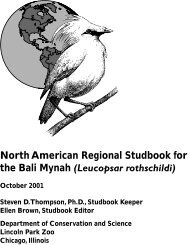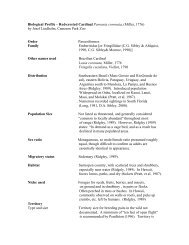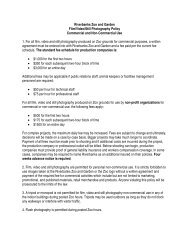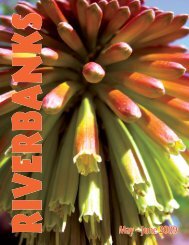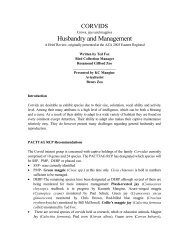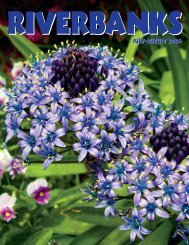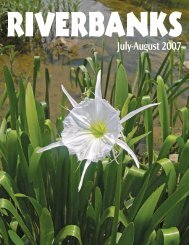Internship: Aquarium Course Syllabus Spring 2009
Internship: Aquarium Course Syllabus Spring 2009
Internship: Aquarium Course Syllabus Spring 2009
Create successful ePaper yourself
Turn your PDF publications into a flip-book with our unique Google optimized e-Paper software.
<strong>Internship</strong>: <strong>Aquarium</strong><br />
<strong>Course</strong> <strong>Syllabus</strong><br />
<strong>Spring</strong> <strong>2009</strong><br />
Instructor: Dave Berkley, Senior Aquarist<br />
A. Description<br />
The <strong>Aquarium</strong> at Riverbanks Zoo and Garden is offering an unpaid internship<br />
experience for qualified students pursuing a marine science (or other biology<br />
related) bachelors or masters degrees. The purpose of this internship is for the<br />
student to gain experience and an in-depth knowledge of employment in a public<br />
aquarium. Upon completion of this program, the student will have obtained a<br />
determined number of credit hours towards his/her degree and the skills<br />
necessary to begin a career in aquatic husbandry. This course is designed for<br />
motivated individuals without any previous experience as an intern or<br />
zoo/aquarium employee.<br />
B. Riverbanks Zoo and Garden’s Mission<br />
The <strong>Aquarium</strong> at Riverbanks Zoo is located in the main plaza in the “<strong>Aquarium</strong><br />
Reptile Complex,” commonly referred to as the ARC. The <strong>Aquarium</strong> is comprised<br />
of five distinct ecosystems showcasing over 125 species of vertebrates and 200<br />
species of invertebrates, in over 80,000 gallons of water. It is the mission of<br />
Riverbanks to foster an appreciation for nature. This is achieved by: providing the<br />
highest standards of care for our living collections, conserving biodiversity<br />
through careful utilization of all available resources, empowering our visitors and<br />
employees to make a difference for conservation, educating people to inspire a<br />
better understanding of nature and the practical relationship between people and<br />
the natural world, recruiting high quality professional staff and acknowledging<br />
their excellence, serving our community by providing an enjoyable recreational<br />
experience, conducting scientific research that benefits both captive and wild<br />
populations, and serving people and nature simultaneously; not one at the<br />
expense of the other.
C. Qualifications<br />
In order to be eligible, the prospective student must meet these guidelines:<br />
• Be currently attending college at the undergraduate or master’s<br />
level for a biology related field of study.<br />
• Complete application form, background check, and accept liability<br />
waivers.<br />
• Provide two references: one of these must be from a college<br />
professor/advisor overseeing the intern’s weekly duties.<br />
• Provide three letters of recommendation.<br />
• Complete a minimum of 160 hours. To meet this requirement, the<br />
student must work 8-20 hours per week (8-20 weeks, depending on<br />
the weekly schedule). Most students work 16 hours per week for<br />
10 weeks.<br />
• Complete a project to be determined by the Senior Aquarist.<br />
• Pass a final written and oral exam to be given by the Senior<br />
Aquarist and <strong>Aquarium</strong> Supervisor.<br />
D. Overview of <strong>Course</strong><br />
The categories of study during the internship include:<br />
1. Assisting with daily maintenance of animal enclosures and exhibits.<br />
2. Learning about animal nutrition and preparing diets.<br />
3. Learning about animal behaviors in both captive and natural<br />
environments.<br />
4. Observing operant conditioning techniques of captive animals.<br />
5. Designing and implementing environmental enrichment<br />
techniques.<br />
6. Being exposed to captive breeding programs (i.e. SSP’s, TAG’s,<br />
studbooks, Fauna Interest Groups, etc.).<br />
7. Assisting Animal Keepers/Aquarists and Veterinarians during<br />
medical procedures.<br />
While there are a minimum number of requirements that must be met (see<br />
addendum 1), there are many things the intern can choose to do on his or<br />
her own that will also count towards the final goal and hour requirements.<br />
The prospective candidate will work closely with the senior aquarist, but at<br />
times be designated to other areas and aquarist staff members.<br />
E. Recommended Literature (all available in house)<br />
Hemdal, Jay. Advanced Marine <strong>Aquarium</strong> Techniques. TFH Publications.<br />
2006.<br />
Noga, Edward. Fish Disease: Diagnosis and Treatment. Wiley-Blackwell. 2000.<br />
Moyle, Peter B. and Cech, Joseph J. Fishes: An Introduction to Ichthyology.<br />
Benjamin Cummings. 2003.<br />
Delbeek and Sprung. The Reef <strong>Aquarium</strong>. SOS Free Stock. 1997.<br />
Escobal, Pedro Ramon. Aquatic Systems Engineering: Devices and How They<br />
Function. Dimension Engineering Press. 2000.
F. Grading Plan<br />
The number of hours accrued during this internship will be decided upon by the<br />
Senior Aquarist and designated academic advisor. Typically, 3 or 4 credit hours<br />
can be earned by the end of the assigned coursework and lectures.<br />
<strong>Course</strong>work will be weighted as follows:<br />
1. Active participation 40 %<br />
2. Final written exam 25 %<br />
3. Final oral exam 25 %<br />
4. Project + 10 %<br />
= 100 %<br />
Grading Scheme: One of the following letter grades will denote the intern’s<br />
academic achievement.<br />
A 90-100%<br />
B 80-89%<br />
C 70-79%<br />
D 60-69%<br />
F ≤ 59%<br />
G. Attendance<br />
Absences for which a medical or court excuse is provided (professional<br />
letterhead required) will be recorded, but not calculated into the active<br />
participation grade. For every unexcused absence, 1% will be deducted from the<br />
active participation grade. More than four (4) unexcused absences will result in<br />
an "F" for the course. This is an occupational course; attendance is crucial, just<br />
as it is in the real world (for which this course is in part designed to prepare you).<br />
H. Lunch and Breaks<br />
Interns shall schedule lunch breaks with their supervisors/co-workers. Interns<br />
are allowed reasonable fifteen-minute breaks, which will be set by supervisors.<br />
Breaks are considered a privilege and the time allowed cannot be accumulated.<br />
Breaks must be taken on grounds. Break times may vary depending on such<br />
factors as the volume of work, the level of staffing, or other conditions that may<br />
affect the Zoo’s ability to give breaks.<br />
I. Appearance Policy<br />
All interns must wear Riverbanks Zoo & Garden uniform shirts, khaki pants or<br />
shorts, a nametag, and appropriate closed toe footwear. No visible tattoos,<br />
visible piercings, or jewelry are allowed.<br />
J. Expected Behavior<br />
All interns must treat Riverbanks Zoo & Garden employees, supervisors,<br />
volunteers, and guests with appropriate courtesy and respect, and engage in no<br />
inappropriate use of Riverbanks property or equipment. The use or influence of<br />
drugs and/or alcohol while on duty is strictly prohibited. Interns are expected to<br />
follow departmental policies and guidelines. Punctuality, dependability,
willingness to follow directions, and a positive and productive manner are also<br />
expected.<br />
K. Expected Work Ethics<br />
The workload and assigned tasks of a Keeper/ Aquarist Intern may be<br />
strenuous and unpleasant at times. Interns are expected to work in difficult<br />
weather conditions, including extreme heat, rain and cold. See the Animal<br />
Keeper/Aquarist job description for additional expectations. Note that in this line<br />
of work, there may be unavoidable emotional responses caused by one’s<br />
personal interest in animal illness, aggression, death/euthanasia, etc.<br />
Interns must understand they are NOT allowed to perform the following duties:<br />
• Shifting animals independently<br />
• Capturing and restraining animals<br />
• Driving Zoo vehicles<br />
• Holding/keeping Zoo keys<br />
• Observing animals or performing other work on rooftops<br />
• Assisting in animal escapes beyond what is expected of all<br />
staff/volunteers as is outlined in the Dangerous Animal Escape<br />
Protocol<br />
L. Tentative Schedule<br />
Each week’s outline provides a general “focus of learning.” Below outlines a<br />
tentative schedule of concepts and skills to be explored in-depth during the<br />
internship.<br />
Week 1: Public <strong>Aquarium</strong> Practices<br />
• Tour: familiarization with zoo, building, different exhibits, and back up<br />
areas.<br />
• Understanding the institution’s messages and means of communication to<br />
local, state, federal, and international third parties.<br />
• Day to day operations. What a “typical day” includes and what can be<br />
expected of aquarium employees.<br />
• Husbandry and its practices: including collection plans, exhibit design, and<br />
daily maintenance.<br />
Week 2: Water Chemistry<br />
• Understanding the principles of fresh and salt water and the roles they<br />
play on various species of aquatic vertebrates and invertebrates.<br />
• Understanding salinity, pH, calcium, alkalinity, nitrate, nitrite, ammonia,<br />
phosphate and the roles they play in an aquarium.<br />
• Practicing fundamental laboratory techniques while complying with all<br />
safety and HAZMAT requirements.<br />
• Troubleshooting water quality issues. Learning how to recognize the early<br />
signs of poor water quality and how to rectify problems with water<br />
changes.
Week 3: Life Support<br />
• Importance of proper life support and its function in a public aquarium vs.<br />
a home aquarium.<br />
• Fundamental system design and key filtration components. Learn to<br />
identify the three main types of filtration: mechanical, biological, and<br />
chemical.<br />
• Understanding secondary and tertiary components: Protein skimmers,<br />
fluidized bed filters, and ozone.<br />
• System design and how to properly set up and maintain life support.<br />
Backwashing and filter changes.<br />
---Must have project determined by the end of Week 3 to be completed by<br />
last day---<br />
Week 4: Collection Identification<br />
• Vertebrate identification and taxonomic review of South Carolina, Tropical,<br />
Sea of Cortez, and Sandy Shores galleries.<br />
• Vertebrate identification and taxonomic review of Atlantic and Indo Pacific<br />
galleries.<br />
• Invertebrate identification and taxonomic review of Sea of Cortez and<br />
Sandy Shores galleries.<br />
• Invertebrate identification and taxonomic review of major groups of corals<br />
in Indo Pacific galleries.<br />
Week 5: Exhibit Husbandry<br />
• The importance of exhibit cleanliness. Routine cleanings inside and<br />
outside exhibits.<br />
• Record keeping with the use of daily reports and ‘tank sheets.’<br />
• Understanding the various types of lighting used and why.<br />
• Familiarization with different tools used in and out of the water.<br />
Week 6: Fish and Invertebrate Husbandry<br />
• Understand general dietary requirements of captive fish and invertebrates;<br />
the importance of food preparation and feeding.<br />
• Specialized feeding: target feeding, stick feeding, broadcast.<br />
• Importance and usage of following the guidelines of the diet notebook.<br />
• Understanding the role and importance of cultures: microalgae, rotifer and<br />
Artemia.<br />
Week 7: Fish and Invertebrate Husbandry Continued<br />
• Understanding the role and purpose of trace elements and additives<br />
including: Lugol’s, kalkwasser, and C-Balance.<br />
• Current research on going at Riverbanks Zoo and Garden and at other<br />
institutions.
• Databases and networking: learning how to utilize different available<br />
resources.<br />
• Bringing it all together: exhibitry, water quality, collection plan,<br />
maintenance, networking.<br />
---Should be half way through project---<br />
Week 8: Fish Disease<br />
• Diagnosis of common parasites and recommended treatments.<br />
• Treating fish and special concerns with medications.<br />
• Necropsies: how to and observing clinical practices.<br />
Week 9: Veterinary Practices and Bio-security<br />
• What is Bio-security? An overview of importance and practices. The<br />
importance of disinfection: bleach, soap, commercially available products.<br />
• Understanding quarantine and the different methods used to approach<br />
different species.<br />
• Case studies: past veterinary challenges seen at the <strong>Aquarium</strong> at<br />
Riverbanks Zoo and Garden.<br />
• Case studies continued.<br />
Week 10: Catch up<br />
• Time allotted to finish semester project.<br />
• Help plan and attend a specimen collecting trip.<br />
• Questions and answers.<br />
• Review for final written and oral exam.


